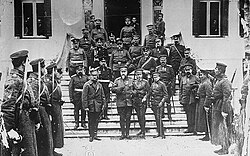
Back Drievoudige Verbond Afrikaans الحلف الثلاثي Arabic Üçlər ittifaqı Azerbaijani اۆچلر اتفاقی AZB Траісты саюз Byelorussian Траісты саюз BE-X-OLD Троен съюз (1882) Bulgarian Trojni savez (1882) BS Triple Aliança (1882) Catalan Trojspolek Czech
Triple Alliance | |||||||||
|---|---|---|---|---|---|---|---|---|---|
| 1882–1915 | |||||||||
 The Triple Alliance as opposed to the Triple Entente in 1914 | |||||||||
| Status | Military alliance | ||||||||
| Historical era | 19th century • 20th century | ||||||||
| 7 October 1879 | |||||||||
• Triple Alliance (Germany / Austria-Hungary / Italy) | 20 May 1882 | ||||||||
• Italy leaves | 3 May 1915 | ||||||||
| |||||||||
| Events leading to World War I |
|---|
 |
|
The Triple Alliance was a defensive military alliance between Germany, Austria-Hungary, and Italy. It was formed on 20 May 1882[1] and renewed periodically until it expired in 1915 during World War I. Germany and Austria-Hungary had been closely allied since 1879. Italy was looking for support against France shortly after it lost North African ambitions to the French. Each member promised mutual support in the event of an attack by any other great power. The treaty provided that Germany and Austria-Hungary were to assist Italy if it was attacked by France without provocation. In turn, Italy would assist Germany if attacked by France. In the event of a war between Austria-Hungary and Russia, Italy promised to remain neutral.
When the treaty was renewed in February 1887, Italy gained an empty promise of German support of Italian colonial ambitions in North Africa in return for Italy's continued friendship. Austria-Hungary had to be pressured by German chancellor Otto von Bismarck into accepting the principles of consultation and mutual agreement with Italy on any territorial changes initiated in the Balkans or on the coasts and islands of the Adriatic and Aegean seas.[2] Italy and Austria-Hungary did not overcome their basic conflict of interest in that region despite the treaty. In 1891, attempts were made to join Britain to the Triple Alliance, which, though unsuccessful, were widely believed to have succeeded in Russian diplomatic circles.[3]
Shortly after renewing the Alliance in June 1902, Italy secretly extended a similar guarantee to France.[4] By a particular agreement, neither Austria-Hungary nor Italy would change the status quo in the Balkans without previous consultation.[a]
On 18 October 1883 Carol I of Romania, through his Prime Minister Ion C. Brătianu, had also secretly pledged to support the Triple Alliance, but he later remained neutral in the First World War due to viewing Austria-Hungary as the aggressor.[5][6] On 1 November 1902, five months after the Triple Alliance was renewed, Italy reached an understanding with France that each would remain neutral in the event of an attack on the other.
When Austria-Hungary found itself at war in August 1914 with the rival Triple Entente, Italy proclaimed its neutrality, considering Austria-Hungary the aggressor. Italy also defaulted on the obligation to consult and agree to compensations before changing the status quo in the Balkans, as agreed in 1912 renewal of the Triple Alliance.[7] Following parallel negotiation with both Triple Alliance (which aimed to keep Italy neutral) and the Triple Entente (which aimed to make Italy enter the conflict), Italy sided with the Triple Entente and declared war on Austria-Hungary.
- ^ a b Grenville, John; Wasserstein, Bernard, eds. (2013). The Major International Treaties of the Twentieth Century: A History and Guide with Texts. Routledge. p. 38. ISBN 9780415141253. Retrieved 2 March 2014.
- ^ Cite error: The named reference
:0was invoked but never defined (see the help page). - ^ George Frost Kennan (1984). The Fateful Alliance: France, Russia, and the Coming of the First World War. Manchester University Press. pp. 82–86. ISBN 978-0-7190-1707-0.
- ^ Charles Seymour (1916). The Diplomatic Background of the War. Yale University Press. pp. 35, 147.
- ^ Hentea, Călin (2007). Brief Romanian Military History. Scarecrow Press. p. 102. ISBN 9780810858206. Retrieved 2 March 2014.
- ^ Becker, Jean-Jacques (30 January 2012). "Chapter Fourteen: War Aims and Neutrality". In Horne, John (ed.). A Companion to World War I. Blackwell Publishing. p. 208. ISBN 9781405123860. Retrieved 2 March 2014.
- ^ (art. 7) https://wwi.lib.byu.edu/index.php/Expanded_version_of_1912_(In_English)
Cite error: There are <ref group=lower-alpha> tags or {{efn}} templates on this page, but the references will not show without a {{reflist|group=lower-alpha}} template or {{notelist}} template (see the help page).
© MMXXIII Rich X Search. We shall prevail. All rights reserved. Rich X Search